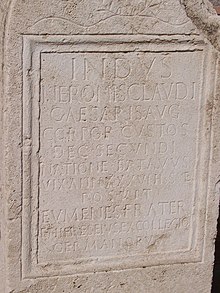Germanic bodyguard
The Germanic bodyguard ( Latin Germani corporis custodes , in the literary sources also numerus Batavorum or cohors Germanorum ) was, in addition to the Praetorians, an additional, personal bodyguard of the early Roman emperors from Augustus to Galba . Already Julius Caesar had had a Germanic bodyguard.
The members of this guard were mainly recruited from the Germanic Batavian tribe , as well as from the Ubiern . Little is known about their organization; The (sub) officer rank of a Decurio is recorded in writing . The strength of the predominantly mounted troops was probably 500 men and was divided into towers ; after reinforcement under Caligula it could have been up to 1,000 men. The accommodation of the Germani corporis custodes may have been located near the horti Dolabellae , in what is now the Roman district of Trastevere .
The Germanic bodyguard was considered loyal and reliable. Emperors like Nero trusted the Germanic tribes in particular because of their non-Roman origins.
The bodyguard was briefly dissolved after the Varus Battle and finally dissolved by Galba in 68, as it had shown itself to be disloyal to the emperor in connection with Nero's downfall and could therefore no longer be regarded as absolutely reliable for the heir to the throne. For the members of the Germanic bodyguard, the dishonorable dismissal resulted in the cancellation of the dismissal fee and the non-granting of Roman citizenship - a privilege otherwise associated with the honorable farewell . Conversely, Heinz Bellen is of the opinion in his treatise that, due to the inglorious dissolution of the imperial bodyguard, the consequence for Rome was that the returning Teutons under Iulius Civilis took active action against the Roman occupation in Lower Germany in the Batavian uprising .
The indirect successor to the dissolved institution was the Equites singulares Augusti , who were also mainly recruited from Teutons .
literature
- Heinz Bellen : The Germanic bodyguard of the Roman emperors of the Julisch-Claudian house (= Academy of Sciences and Literature Mainz. Humanities and social science class. Treatises of the humanities and social science class. Born 1981, No. 1). Steiner, Wiesbaden 1981, ISBN 3-515-03491-9 .
- Michael P. Speidel : Germani Corporis Custodes. In: Germania 62, 1984, pp. 31-34.
- Oliver Stoll : Bodyguard. In: Reallexikon der Germanischen Altertumskunde (RGA). 2nd Edition. Volume 18, Walter de Gruyter, Berlin / New York 2001, ISBN 3-11-016950-9 , pp. 232-233 ( excerpt from Google Books ).
Web links
Remarks
- ^ Museo Nazionale Romano , Diocletian's Baths , Rome. Inscription: AE 1952, 148 : Indus / Neronis Claudi / Caesaris Aug (usti) / corpor (is) custos / dec (uria) Secundi / natione Batavus / vix (it) ann (os) XXXVI h (ic) s (itus) e (st) / posuit / Eumenes frater / et heres eius ex collegio / Germanorum “Indus, bodyguard of Nero Claudius Caesar Augustus, from the Decuria of Secundus, of Batavian origin, lived 36 years, is buried here. (The tombstone) was erected by his brother and heir Eumenes, from the collegium of the Teutons ”.
- ^ Suetonius , Caligula 58, 3 and inscriptions, e.g. B. AE 1952, 148 .
- ^ Suetonius, Caligula 43 .
- ↑ Suetonius, Galba 12 .
- ^ Caesar, de bello Gallico 7, 13, 1 .
- ↑ Alexandra W. Busch : Military in Rome. Military and paramilitary units in the imperial cityscape (= Palilia vol. 20). Reichert, Wiesbaden 2011, ISBN 3-89500-706-4 , The accommodation of Germani corporis custodes , p. 94
- ^ Edmund Groag : Cornelius 136 . In: Paulys Realencyclopadie der classischen Antiquity Science (RE). Volume IV, 1, Stuttgart 1900, Col. 1298.
- ↑ Suetonius, Galba 12 : multisque experimentis fidelissimam .
- ^ Tacitus , Annalen 15, 58 : Germanis, quibus fidebat princeps quasi externis .
- ↑ Suetonius, Galba 12
- ↑ Heinz Bellen: The Germanic bodyguard of the Roman emperors of the Julio-Claudian house , pp. 103, 104
